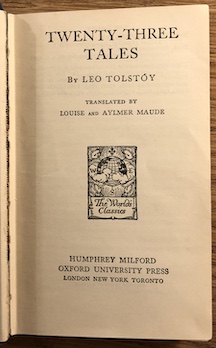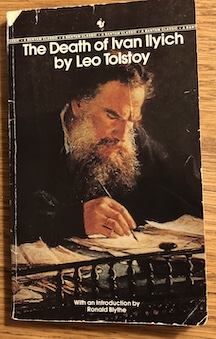I am continuing my series on Gaining Wisdom, suggested by a friend’s request to list the forty books a person should read before they turn forty. This week we look at Tolstoy.

Profound Truth Embedded in Russian Stories
Leo Tolstoy’s short stories, novelettes, and more recently his non-fiction, have had a major impact on my life. I began reading Tolstoy when I inherited an old book from my great-grandmother, Twenty-Three Tales, published in 1906. This is one of my favorite books. Not just because I love the stories, but because the book is old, and just holding it and smelling the old paper makes me feel wise. So, as I began writing this blog, I pulled the book from the shelf and carefully opened to the table of contents. And there they were, the stories that turned me into a reader: God Sees the Truth but Waits; What Men Live By; and The Story of Ivan the Fool. What Men Live By is my favorite, and I have read it many times. I was deeply impacted by The Story of Ivan the Fool, but I could only remember the ending and not the details. So rather than continuing to write, I took my old book upstairs, brewed some hot tea and sat by the fireplace to reread The Story of Ivan the Fool. I was NOT disappointed!
 Written in 1885, Ivan the Fool explores the possibility that wealth, power, and fame do not lead to a meaningful life or any kind of lasting happiness. It is a story for our day! I wish more young people would read this story and think deeply about the possibility that Ivan was no fool, but wise enough to see the truth about how to live well. I would love to teach this story to high school students and lead that discussion.
Written in 1885, Ivan the Fool explores the possibility that wealth, power, and fame do not lead to a meaningful life or any kind of lasting happiness. It is a story for our day! I wish more young people would read this story and think deeply about the possibility that Ivan was no fool, but wise enough to see the truth about how to live well. I would love to teach this story to high school students and lead that discussion.
What Men Live By is still my favorite short story by Tolstoy. This story illuminates why it is hard to trust God and His plan. It reminds us of how little we know about what is really happening in our lives or in heaven. The story is also a powerful reminder of what God requires of us, and why it feels counterintuitive to be obedient to His commands. I think everyone should read this story and discuss it with friends. It is a free download when you click the title above. And if anyone reads it and would like to discuss it with me, let me know; I would love nothing more than to hang out with you on Zoom and talk about my favorite story.
 In addition to Tolstoy’s short stories, I have been impacted by his novelette, The Death of Ivan Ilyich, and have read it several times. Like all of Tolstoy’s short stories, it illustrates how worldly success, after it has been achieved, can leave us disappointed and empty. This novelette describes the characters in such clear and vivid language that, after a few pages, it feels like you are there with them, even though it is set in 19th century Russia. Once again, anyone who reads this short novelette will not have wasted their time.
In addition to Tolstoy’s short stories, I have been impacted by his novelette, The Death of Ivan Ilyich, and have read it several times. Like all of Tolstoy’s short stories, it illustrates how worldly success, after it has been achieved, can leave us disappointed and empty. This novelette describes the characters in such clear and vivid language that, after a few pages, it feels like you are there with them, even though it is set in 19th century Russia. Once again, anyone who reads this short novelette will not have wasted their time.
Years after falling in love with Tolstoy’s short stories, I read Paul Johnson’s Intellectuals. Johnson devoted a chapter of this book to Tolstoy’s tragic life, and how he fell far short of the ideals he articulates in his stories. Philip Yancey also devotes a chapter to Tolstoy in his book, Soul Survivor, and shows the contrast between what Tolstoy wrote and how he lived. Johnson sees Tolstoy as a philosopher who should not be trusted. Yancey sees him as a tortured soul in need of God’s grace.
A couple of years ago, I read Tolstoy’s A Confession: The Gospel in Brief and What I Believe. This is a non-fiction account of how he came to faith, and how empty life is without faith in God. He also writes about the foolishness of being religious without faith, which is how he perceived many who were part of the 19th century Orthodox church. There is no doubt that there is a large gap between what he wrote, what he believed, and how he lived.
The Death of Ivan Ilyich and Other Stories (Vintage Classics) translated by Richard Pevear and Larissa Volokhonsky, has a wonderful introduction describing Tolstoy’s life and the circumstances under which he wrote. This book would be a good beginning if you are looking for a place to start your adventure with this Russian author.

Brad, I really enjoy reading your blogs!
It’s something to think about , I’ll let you know when I get to reading it I’m intrigued.